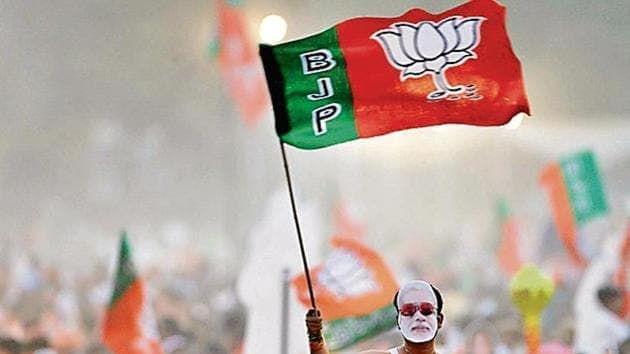
The Bharatiya Janata Party (BJP) will aim to secure a majority on its own in Maharashtra and widen its victory margin in Haryana, two leaders of the party said on Saturday.
These two states got a BJP chief minister for the first time in the 2014 assembly election and they vote again on October 21 to decide the fate of Devendra Fadnavis (Maharashtra) and Manohar Lal Khattar (Haryana). The BJP has set a target of 220-plus in the 288-member Maharashtra assembly (along with its ally, Shiv Sena) and 75-plus in the 90-seat Haryana House.
The BJP is yet to announce a seat-sharing deal with the Shiv Sena, but analysts say it is possible that the latter will, for the first time, accept the status of a junior partner in the coalition.
The BJP broke its alliance with the Sena in the 2014 assembly election after the latter refused to accept a 50:50 seat sharing formula. The BJP fell short of the majority mark (145 seats) and could win only 122 seats, almost double the Sena's 63. It will aim to cross the halfway mark this time, the first leader quoted above said.
BJP chief Amit Shah is expected to be in Mumbai on Sunday to give the final touches to the seat-sharing pact.
"The BJP government in Maharashtra and Haryana has taken development and good governance to new heights in these states. I appeal to BJP workers in these states to take government's achievements to people and form government with a huge mandate," Shah wrote on Twitter.
"We would like to field candidates in 170-odd seats," the first BJP leader added. This would mean the Sena would be left with 110-125 seats.
"Our alliance with Shiv Sena will secure another victory," BJP general secretary Bhupendra Yadav said. "Chief minister Fadnavis is seeking a second term on the basis of his work."
The BJP has managed to tighten its control over municipal and panchayat bodies under Fadnavis's rule, and his "non-confrontationist" approach in governance gives the BJP an advantage over its rivals.
Fadnavis will remain the BJP's chief ministerial face although Prime Minister Narendra Modi and others will campaign extensively. The BJP also expects a divided Opposition to give it a head-start in Haryana, the northern state it won for the first time in 2014 by securing 47 out of 90 assembly seats.
The state Opposition is split into three major groups - the Congress, the Indian National Lok Dal and its breakaway outfit the Jannayak Janta Party. "All three compete for Jat votes in Haryana. This is to BJP's advantage," the second BJP leader said. "By appointing a non-Jat as the chief minister of Haryana, the BJP managed to send a message across to the rest of the population."
Jats make up about one-fourth of the state electorate, but their domination in education, jobs, administration and elected bodies has been a cause of resentment among many other communities. The BJP has taken the best advantage of this faultine and established itself as the most dominant non-Jat party of Haryana. Barring some gaffes and violence during the Jat quota stir, Khattar has managed to stay away from major controversies and the taint of corruption. The BJP considers this a huge advantage over others who stake claim for the chief minister's post.
Like Fadnavis, Khattar, too, has delivered big victories for the BJP. The BJP led in 79 out of 90 assembly segments of Haryana in the parliamentary elections.
"It's test of Modi-Shah proteges Manohar Khattar and Devendra Fadnavis. Given their close proximity to the leadership, these two would go for high pitch campaign and expect profitable returns," said Sidharth Mishra, President, Centre for Reforms, Development and Justice